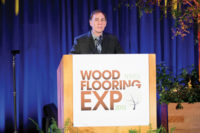
To
be more “green,” Mirage ensures its wood waste is recycled, practices
responsible forestry practices and aims to reduce its use of raw materials, the
company says. Pictured here is Red Oak, part of the company’s Natural
collection of hardwood flooring.
Manufacturers of hard surface flooring and installation products seem to agree: the number of products marketed as environmentally friendly is skyrocketing. And, the increasing demand for “green” products is presenting unique challenges. Additionally, many manufacturers note creating green products is not inexpensive, yet consumers often expect to see little or no price difference.
Jeremy Whipple, Roppe Holding marketing manager, says green has without question taken on a life of its own. “We see environmental issues being at the forefront of product development and one of the key reasons why a product is purchased,” he says. However, he adds, “it will be a tremendous challenge to continue the upward trend in new and innovative environmentally sustainable products” because creating green products is more expensive than their non-green counterparts.

Flexco
resilient flooring features several “green” benefits, including low VOCs and
recycled content.
David Voll, Amtico sr. marketing manager, says green has become such a high priority for architects and designers it will continue to grow even in an uncertain economy. “Green is very important to us, and it’s very important to the education and A&D community,” he says.
The same is true in the hardwood flooring segment. Vincent Dagnault, Lauzon sr. marketing director of merchandising, says green/environmental consciousness has become so popular it is emerging as the de facto way to do business. He predicts: “Awareness is going to have to raise to the point where customers are ready to pay for it, or green will simply become a standard everywhere.”
One way Lauzon is trying to raise awareness is by hosting tours of its mills in Quebec, where dealers, designers, architects and builders can see Lauzon’s efforts firsthand. “We fly a couple hundred people up a year, and their visit gives them a new perspective. They see, for example, that we manage our own forest,” he explains.
Mullican Flooring is also touting the importance of responsible forestry in its products. The company’s prefinished domestic hardwood floors carry the “Verified Sustainable” label from Appalachian Hardwood Manufacturers Inc. The designation ensures that the wood used in Mullican flooring is harvested responsibly from the Appalachian region.

USFloors’
Green Island in-store merchandising display, is designed to showcase the
company’s EcoFloors collection of bamboo, cork and linoleum flooring.
As for the future of environmental sustainability, he predicts consumers will become better educated and even more informed about green products, both through Mirage’s efforts to train retailers on green breakthroughs, and also from the marketing messages of the industry.
Piet Dossche, CEO of flooring maker USFloors, predicts green will become such an important part of construction that any sites without green features will be harder to sell. “I am convinced that within the next 5 to 10 years, those houses and commercial buildings with no [green] features … will be more difficult to lease or sell and will be considerably less valuable,” he notes.
For its part, USFloors recently opened a manufacturing plant in Dalton, Ga., that will be partly powered through solar energy collected from photovoltaic panels on the roof. According to the company, it is the first flooring company in North America to power a plant using solar power.
In installation products, green has also had a major impact, says Jeff Leone, MAPEI director of strategic marketing. “Environmental issues are no longer a unique topic – they are part of how we live and build. Yesterday’s environmental manufacturing efforts were a game-winner for companies; today they are just the price of the ante to get into the game,” he says.
Jeremy Gorr, Custom Building Products sr. marketing channel manager agrees, saying the green movement has fundamentally changed the role the environment plays in business and vice versa. “Most environmentally sound practices – reducing energy and fuel consumption, recycling and minimizing waste – are actually cost-saving practices themselves. If we do it correctly, we shouldn’t have to choose between cost efficiency and environmental responsibility,” he says.
No matter what challenges the economy presents, green is here to stay, says Gary Liddington, W.F.Taylor business manager. “It’s like a snowball rolling downhill, and the momentum will only increase,” he says. “We in the industry have a real need to make products that are friendly to the environment and lessen our use of natural resources.”




